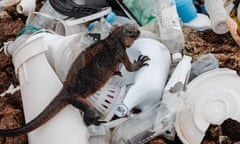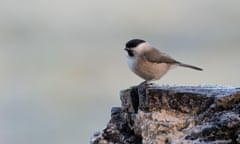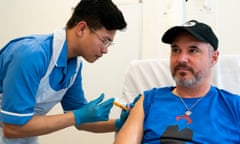Science Weekly
Twice a week, the Guardian brings you the latest science and environment news

Botanist Robin Wall Kimmerer: ‘The clock is ticking but the world will teach us what we need to do’ – podcast
Robin Wall Kimmerer, a botanist and author of Braiding Sweetgrass, tells Madeleine Finlay what we can learn from the most ancient plants on Earth, why we need to cultivate gratitude for the natural world and what western science could learn from Indigenous knowledge

Election risks, safety summits and Scarlett Johansson: the week in AI – podcast
It’s been a busy week in the world of artificial intelligence. OpenAI found itself in hot water with Scarlett Johansson after launching its new chatbot, Sky, drawing comparisons to the Hollywood star’s character in the sci-fi film Her. In South Korea, the second global AI summit took place, and a report from the Alan Turing Institute explored how AI could influence elections. The Guardian’s UK technology editor, Alex Hern, tells Madeleine Finlay about what’s been happening

Concrete without CO2: can our biggest building material go green? – podcast
Concrete is strong and durable – but is also terrible for the planet, due to one key ingredient: cement. But researchers have now found a way to recover old cement while also reducing the environmental impact of recycling steel

Backstabbing, bluffing and playing dead: has AI learned to deceive? – podcast
As AI systems have grown in sophistication, so has their capacity for deception, according to a new analysis from researchers at Massachusetts Institute of Technology (MIT). Dr Peter Park, an AI existential safety researcher at MIT and author of the research, tells Ian Sample about the different examples of deception he uncovered, and why they will be so difficult to tackle as long as AI remains a black box

How much protein is too much? – podcast
Sales of cottage cheese are booming thanks to a boost from protein-hungry social media influencers. But do we really need all this extra protein? Madeleine Finlay speaks to Joanne Slavin, a professor of food science and nutrition at the University of Minnesota, to find out what exactly protein is doing in our bodies, and what happens to it when we consume it in excess

The stream of plastic pollution: could a global treaty help us turn off the tap? – podcast
Guardian Seascapes reporter Karen McVeigh tells Madeleine Finlay about a recent trip to the Galápagos Islands, where mounds of plastic waste are washing up and causing problems for endemic species. Tackling this kind of waste and the overproduction of plastic were the topics on the table in Ottawa this week, as countries met to negotiate a global plastics treaty. But is progress too slow to address this pervasive problem?

From birds, to cattle, to … us? Could bird flu be the next pandemic? – podcast
As bird flu is confirmed in 33 cattle herds across eight US states, Ian Sample talks to virologist Dr Ed Hutchinson of Glasgow University about why this development has taken scientists by surprise, and how prepared we are for the possibility it might start spreading among humans

Hardwired to eat: what can our dogs teach us about obesity? – podcast
Labradors are known for being greedy dogs, and now scientists have come up with a theory about the genetic factors that might be behind their behaviour. Science correspondent and labrador owner Nicola Davis visits Cambridge University to meet Dr Eleanor Raffan and Prof Giles Yeo to find out how understanding this pathway could help us treat the obesity crisis in humans

Who really wins if the Enhanced Games go ahead? – podcast
Billed as a rival to the Olympic Games, the Enhanced Games, set to take place in 2025, is a sporting event with a difference; athletes will be allowed to dope. Ian Sample talks to chief sports writer Barney Ronay about where the idea came from and how it’s being sold as an anti-establishment underdog, and to Dr Peter Angell about what these usually banned substances are, and what they could do to athletes’ bodies

Soundscape ecology: a window into a disappearing world – podcast
Guardian biodiversity reporter Phoebe Weston tells Madeleine Finlay about her visit to Monks Wood in Cambridgeshire, where ecologist Richard Broughton has witnessed the decline of the marsh tit population over 22 years, and has heard the impact on the wood’s soundscape

The senior Swiss women who went to court over climate change, and won – podcast
The European Court of Human Rights has ruled that Switzerland’s weak climate policy had violated the rights of a group of older Swiss women to family life. Ian Sample and Ajit Niranjan discuss why the women brought the case and what the ruling could mean for climate policy

Remembering physicist Peter Higgs – podcast
The Nobel prize-winning British physicist Peter Higgs has died aged 94. Higgs theorised the existence of the Higgs boson particle, part of an attempt to explain why the building blocks of the universe have mass, five decades before its existence was confirmed in 2012. Ian Sample and Madeleine Finlay look back on the life and legacy of a giant of science

Horny tortoises and solar mysteries: what scientists can learn from a total eclipse – podcast
For scientists a total solar eclipse can be a fleeting chance to understand something deeper about their field of research. Madeleine Finlay meets professors Huw Morgan and Adam Hartstone-Rose to find out what they hoped to learn from 8 April’s four minutes of darkness

The science of ‘weird shit’: why we believe in fate, ghosts and conspiracy theories
Psychologist Chris French has spent decades studying paranormal claims and mysterious experiences, from seemingly-impossible coincidences to paintings that purportedly predict the future. Ian Sample sits down with French to explore why so many of us end up believing in, what he terms, ‘weird shit’, and what we can learn from understanding why we’re drawn to mysterious and mystic phenomena

Hypermobility: a blessing or a curse?
Being more flexible than the average person can have its advantages, from being great at games such as Limbo to feeling smug in yoga class. But researchers are coming to understand that being hypermobile can also be linked to pain in later life, anxiety, and even long Covid. Madeleine Finlay hears from the science correspondent Linda Geddes about her experience of hypermobility, and finds out what might be behind its link to mental and physical health




